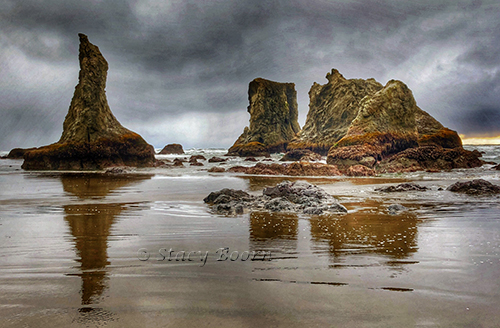 At the beginning of this month I spent a few days along the southwestern coast of Oregon. I had anticipated beach walks at low tide to scour the base of seastacks for anemones and sea stars. As well, I had hoped for beautiful sunsets and sunrises over the waves and winged ones taking flight. But instead I encountered cold, rainy, windy and even snowy days and nights.
At the beginning of this month I spent a few days along the southwestern coast of Oregon. I had anticipated beach walks at low tide to scour the base of seastacks for anemones and sea stars. As well, I had hoped for beautiful sunsets and sunrises over the waves and winged ones taking flight. But instead I encountered cold, rainy, windy and even snowy days and nights.
 Fortunately I had a beautiful room in the Bandon Beach Motel right on the cliff edge. I could look west and south over a most beautiful stretch of scenic jagged coastline. Several times I donned waterproof clothes to walk in the pelting rain to take a few photos. Those few days were all about water from the sky, the ebb and flow of the ocean, and the snow blanketing the coastal hills.
Fortunately I had a beautiful room in the Bandon Beach Motel right on the cliff edge. I could look west and south over a most beautiful stretch of scenic jagged coastline. Several times I donned waterproof clothes to walk in the pelting rain to take a few photos. Those few days were all about water from the sky, the ebb and flow of the ocean, and the snow blanketing the coastal hills.
March 22 was World Water Day. It is a time when people all over the world say yes to our shared responsibility to protect this vital resource. But for our federal administration, it’s yet another day of discounting that duty—at a terrible cost to the natural world.
Oceans and coastlines are more vulnerable now that the Migratory Bird Treaty Act has been gutted.
Rivers and lakes are at risk under relaxed pollution regulation.
 Streams and wetlands are threatened by efforts to roll back the Clean Water Plan.
Streams and wetlands are threatened by efforts to roll back the Clean Water Plan.
And all of this is complicated by the global impact of climate change, ignored and even denied at the federal level.
Protecting this precious resource is a challenge.
World Water Day was created by the United Nations to focus attention on the importance of preserving our planet’s freshwater supply. The global water crisis is affecting over 844 million people. This number is so high one might think nothing we do could possibly reverse this trend. But that is not so!
About the size of Maryland, Rwanda is likely to be the first sub-Saharan African country to achieve one of the biggest, most audacious goals for a developing country: universal access to clean water. It’s a stunning prediction given that genocide in 1994 left Rwanda as good as dead.
Clean water is a key component in Rwanda’s remarkable return to life. President Paul Kagame’s government is committed to providing clean water for everyone in the nation of 12 million people by 2024.
 Let there be water, water, everywhere – clean water accessible to all peoples! Like Rwanda we can do this. May the ocean, even on cold and foreboding days, inspire us with her beauty.
Let there be water, water, everywhere – clean water accessible to all peoples! Like Rwanda we can do this. May the ocean, even on cold and foreboding days, inspire us with her beauty.
